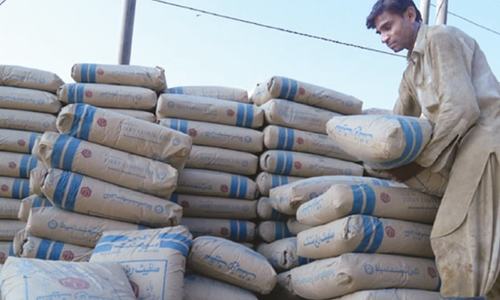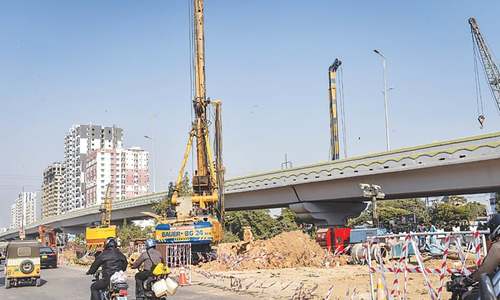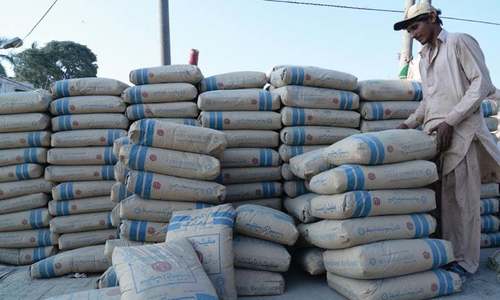Has the cement cartel ceased to exist? Or has the current state of the economy pushed the All Pakistan Cement Manufacturers Association (APCMA) into a tactical retreat?
The APCMA emerged out of the abnormal demand for cement in 1992 amidst reconstruction and rehabilitation efforts. Its objectives under the memorandum of association are to provide a common forum for cement manufacturers besides protecting, safeguarding and promoting their interests. In addition, monitoring production levels and securing cooperation among members are also its objectives.
However, it did not take long for the APCMA to eliminate the information asymmetry among cement manufacturers. This asymmetry was supposed to keep different manufacturers engaged in competition in order to deliver better value to customers. The association did away with it by increasing cement prices simultaneously, setting quotas for its members and minimising competition to push up profits at the expense of consumers.
An audit firm would count the number of despatches from each manufacturer to keep the industry-wide collusion intact
Their activities were scrutinised by the Monopoly Control Authority (MCA), which preceded the Competition Commission of Pakistan (CCP). It concluded that cement manufacturers must set up their stores in major cities to sell cement directly to consumers. This would create a benchmarking system for the MCA to check whether the hike in rates was caused by manufacturers or retailers.
The move did not stop the APCMA’s collusive practices though. In 2003, there was a reduction in excise duties on cement by 25 per cent. Instead of passing the benefit on to consumers, manufacturers collectively absorbed the reduction into their profits. They justified it in the name of higher input costs that, they claimed, netted off this reduction.
In 1998, there was another overnight price surge of Rs100 per 50kg bag although none of the input costs had gone up.
This happened once again in 2011-12 when sales tax and the federal excise duty went down by 1pc and Rs200 per tonne, respectively, along with the removal of 2.5pc special excise duty. It led to the savings of Rs23-25 per bag. Yet the retail price soared by Rs35 per bag.
A CCP enquiry concluded that although there were inflationary pressures, documents dating back to 2001-04 revealed how the APCMA set quotas for manufacturers. The APCMA’s audit firm, Riaz Ahmad and Company Chartered Accountants, would count the outgoing despatches from each manufacturer and keep the industry-wide collusion intact. The APCMA refused to cooperate with the anti-collusion watchdog.
The real thrust in the matter came with the new Competition Ordinance, which allowed the body to conduct a search on APCMA premises. Hence, a fine of Rs6.53 billion, or 7.5pc of annual revenues of APCMA members, was imposed in 2008. Not surprisingly, the APCMA challenged it in court and has not paid even a single rupee as of today. Lucky Cement Ltd, which received a fine of Rs1.27bn, does not even maintain a provision for it on its balance sheet, emboldening others to follow suit.
The cartel finds itself in jeopardy whenever one member expands its capacity unilaterally. Such a move shakes up quotas and breaks down the industry-wide collusion until all members reach a new agreement. This is why expansions in the cement industry are always in phases. Either one member breaks the quota agreement and causes all others to do the same or all members expand simultaneously in the same proportion. These phases of expansion were 1995-2000, 2005-10 and 2015-21.
Major expansions are currently in progress as various manufacturers are commissioning additional capacity. However, macroeconomic variables are not in favour of the APCMA this time. Owing to stagflation in the economy, new regulations for real estate and high interest rates that discourage construction, the outlook for the local consumption of cement appears compressed.
Read: Cement sales inch up
Cement prices are falling continuously because of oversupply amidst poor demand. For the time being, the export market appears lucrative for cement manufacturers owing to a rapid depreciation. Exports to Afghanistan take place by road. Exports to other countries are by sea or by air. India has ceased to be an export market. Hence, manufacturers with more geographical feasibility to exploit export channels are benefitting while the rest are lagging.
By supplying to world markets, cement manufacturers are doing something that they usually do not prefer: participating in a perfectly competitive market.
So what will happen once the economy recovers and local demand goes up again? What will happen when massive projects like water reservoirs or Naya Pakistan Housing Scheme kick in? What will happen when allocations under the public-sector development programme gain momentum?
The answer is simple: the cartel will rear its head once again unless reforms are swiftly carried out to prevent collusion.
The writer is a freelance contributor
Published in Dawn, The Business and Finance Weekly, March 2nd, 2020















































